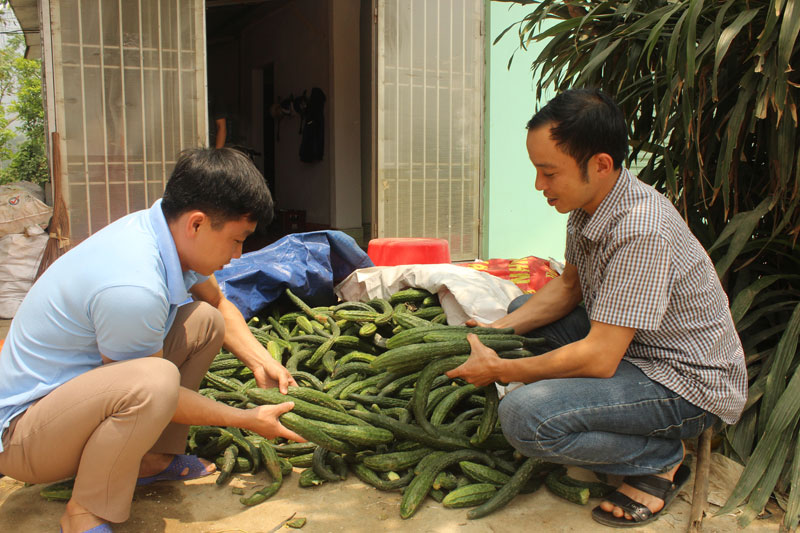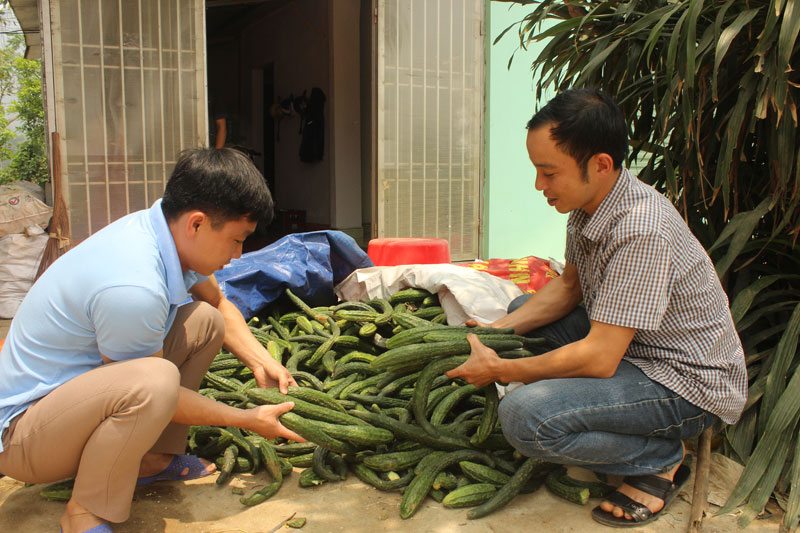
(HBO) - Kim Boi Green Agriculture Cooperative in Du Sang commune has cooperated with Hoa Binh Paciffic Company to solve the stable output of Japanese cucumbers for 100 farmer households in the commune.

Mr. Bui Thanh Son (left) is inspecting and
classifying Japanese cucumber products before delivery to the Company.
From the spring crop of 2010, Son started by
planting watermelon with an area of nearly 1 hectares; he invested 40 million
VND from family funds and friends’ borrowing but the weather was very hot, the
field was so dry, there was lack of irrigated water when the cucumbers were
growing, so all the plants and cucumbers were losing money. In the next crop,
Mr. Son continued to invest 20 million VND in raising pumpkins and raising
chickens but failed. After three failures, Mr. Son paused to study techniques
through newspapers, radio and Internet. In 2013, Son shifted to plant Japanese
cucumbers on an area of 7,000 m2. Due to gaining technical knowledge, the melon
harvest was successful, he collected 15 tons of fruit sold through the link
with Paciffic Company, which made him earn over 30 million VND, excluding all
the expenses, he got nearly 20 million VND. Up to now, the area of melon brings
the revenue of about 10 million VND / 1.000 m2.
In 2018, the Cooperative cooperated with
nearly 100 households in commune to plant Japanese cucumbers, with an area of
14 hectares, 50 tons / hectare of production, etc. The Cooperative buys from
the farmers at the price of 2,600 VND/ kg. Basically, the farmers follow
strictly the technical process, therefore, the products are in good quality,
the defective products are less. A season of Japanese cucumbers is every3
months, from seedling to harvesting, so the Cooperative only plant 2 crops per
year, in the rest time, they plant other seasonal vegetables, such as planting
pumpkins in spring, tomatoes, potatoes, carrots, colored vegetables in winter.
The Cooperative has a chartered capital of 1
billion VND, of which the fixed capital is 700 million VND and the working
capital is 300 million VND. The Cooperative has not had its headquarters,
currently rent a location in Suoi Con village, Kim Boi commune and setting up a
representative office in the house of the Cooperative Director. In 2018, the
Cooperative was supported with seedlings and fertilizer by the Ethnic Minority
Department with over 200 million VND to develop the production. The Cooperative
is also applying for development loans from the Provincial Cooperative
Alliance.
According to data from the Hoa Binh Provincial Party Committee, the industrial production index for the first six months of 2025 is estimated to have increased by 20% compared to the same period last year. This marks the highest year-on-year growth rate for this period since 2020.
In the first six months of 2025, Hoa Binh province’s export turnover was estimated at 1.145 billion USD, marking an 18.11% increase compared to the same period in 2024. Import turnover was estimated at $ 804 million, a 17.15% increase, which helped the province maintain a positive trade balance.
The lives of the ethnic minority farmers in Tan Lac district have gradually improved thanks to the new directions in agricultural production. This is a testament to the collective strength fostered through the professional associations and groups implemented by various levels of the district’s Farmers’ Union.
With the motto the "product quality comes first,” after nearly one year of establishment and operation, Muong village’s Clean Food Agricultural and Commercial Cooperative, located in Cau Hamlet, Hung Son Commune (Kim Boi district), has launched reputable, high-quality agricultural products to the market that are well-received by consumers. The products such as Muong village’s pork sausage, salt-cured chicken, and salt-cured pork hocks have gradually carved out a place in the market and they are on the path to obtaining the OCOP certification.
In the past, the phrase "bumper harvest, rock-bottom prices" was a familiar refrain for Vietnamese farmers engaged in fragmented, small-scale agriculture. But today, a new spirit is emerging across rural areas of Hoa Binh province - one of collaboration, organisation, and collective economic models that provide a stable foundation for production.
Maintaining growing area codes and packing facility codes in accordance with regulations is a mandatory requirement for agricultural products to be eligible for export. Recently, the Department of Agriculture and Environment of Hoa Binh province has intensified technical supervision of designated farming areas and packing facilities to safeguard the "green passport" that enables its products to access international markets.



